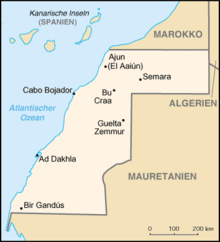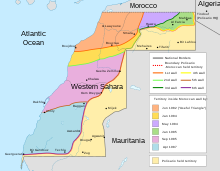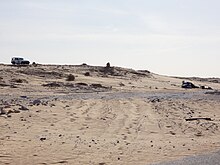Western Sahara Conflict
The Western Sahara conflict is a conflict between Morocco and the Frente Polisario over the territory of Western Sahara . Morocco claims Western Sahara as part of its national territory, while the Polisario seeks independence for the entire territory. In 1976 it proclaimed the Democratic Arab Republic of the Sahara , which was recognized by around 80 states, of which around 30 withdrew recognition or suspended it until the conflict was resolved. The area of Western Sahara is divided into a larger western area under the control of Morocco and an eastern and southern, also called free zone , under the control of the Polisario Front.
prehistory
Spain had waged the Rif War in 1893 and the Rif War in 1909 and established the Spanish-Morocco Protectorate according to the Treaty of Fès of March 30, 1912 and the Franco-Spanish Treaty of November 27, 1912 .
In 1921 a war began with the aim of extending its rule to the entire colonial area in northern Morocco that had been assigned to it . In 1926 Spain finally succeeded, starting from its old bases on the coast ( Plaza de soberanía ), to conquer the entire protectorate area, among other things with chemical weapons, during which more than 10,000 mustard gas containers were dropped , which has effects to this day.
The local population resisted colonization until the 1930s. After Morocco was granted independence by France in 1956 , resistance to Spanish rule increased in Western Sahara.
1960 went down in history as the African Year : Large parts of Africa became independent within a year. Morocco and Mauritania brought the Western Sahara issue to the United Nations Decolonization Committee in 1963 . In 1965 the General Assembly of the United Nations called on Spain in a first resolution on the Western Sahara conflict to decolonize Western Sahara and to grant the population the right to self-determination.
In 1967 Spain agreed to hold a referendum on the status of Western Sahara. The neighboring countries of Morocco and Mauritania approved the project. When Spain continued to delay holding the referendum, in May 1973 a group of former students around al-Wali Mustafa Sayyid founded the liberation movement Frente Polisario , which began an armed struggle against Spanish rule.
Morocco's interest in Western Sahara is historically explained by an anti-colonial ideology of liberation whose goal in the mid-20th century was the creation of a Greater Morocco that would encompass all of Mauritania and western Algeria . After independence, the sweeping claims were dropped in order to at least hold the Western Sahara. This stretch of desert was of little economic or military importance until, in the 1960s, a Spanish company began to mine the large phosphate deposits of Bou Craa , which had been discovered by accident a few years earlier.
Retreat of Spain
Since 1974, the Moroccan King Hassan II has called for the Western Sahara to be annexed to Morocco without holding a referendum. At the end of 1974 Spain announced that the following year the population would decide in a referendum on the future of Western Sahara. In the same year, Mauritania and Morocco obtained UN General Assembly Resolution 3292 : it called on Spain not to hold the referendum; Instead, the International Court of Justice should prepare an opinion to clarify the affiliation of the Western Saharan area.
The International Court of Justice had to weigh between the historical ties of Western Sahara to Morocco and Mauritania on the one hand and the right of the Saharawi people to self-determination. The final report, published on October 16, 1975, stated that the right to self-determination had a higher value. Therefore, the people of Western Sahara should decide on its future in a referendum.
On the same day, Hassan II announced a march of Moroccan civilians into Western Sahara to underscore the historical ties between Morocco and Western Sahara. After the Moroccan military invaded northern Western Sahara in advance to prevent Algeria from intervening and to tie up Polisario forces, the Green March took place from November 6th to 10th. Morocco had organized 350,000 participants who crossed the Moroccan-Western Saharan border in several places and advanced a few kilometers into Western Saharan territory. An advance on the capital Al-Aiun did not take place because of the Spanish military presence. The German journalist Mourad Kusserow , who worked for Deutsche Welle , also took part in the Green March . He reported on it in a thoroughly pro-Moroccan view in his book Destiny Agadir .
As a result of negotiations between Morocco, Mauritania and Spain, the Spanish parliament decided to give up colonial rule over Western Sahara on February 26, 1976.
Annexation and resistance
After a meeting of Sahrawi tribal leaders had agreed the division of Western Sahara between Morocco and Mauritania on 26 February 1976 the Polisario on 27 February 1976 called in Bir Lehlou the Sahrawi Arab Democratic Republic of. Morocco and Mauritania, however, rated the approval of the tribal princes as sufficient approval of the people, so they waived another referendum and divided the territory of Western Sahara among themselves:
Morocco annexed the northern two thirds of Western Sahara, Mauritania the southern third. However, the General Assembly of the United Nations continued to call for a referendum in resolution 3458. The Polisario, which had received financial and military logistical support from Algeria since 1975 , led an intense resistance struggle against Morocco and Mauritania. As a result, Mauritania renounced all claims in Western Sahara in 1979, whereupon Morocco also annexed the southern third of Western Sahara, which was formerly administered by Mauritanians. In the further course of the fighting, Morocco was able to push the Polisario fighters further inland. At the same time, a system of walls, the so-called Moroccan Wall , was built to prevent Polisario fighters from entering the Moroccan-controlled area. This wall system was expanded after each significant gain of territory in Morocco to protect the newly controlled areas. Since 1991 the length of the outermost ramparts, which separates the Moroccan-controlled area from the Polisario area, has been around 2500 kilometers.
Some of the local residents who fought on the side of the Polisario fled to Algeria, where around 180,000 Saharawi people have lived in refugee camps near Tindouf since 1976 and are almost entirely dependent on aid supplies from the EU, the United Nations and other international non-governmental organizations .
The conflict between Morocco and Algeria, which wanted to prevent the expansion of Moroccan power, smoldered for years. It was also worn in organizations of which both countries are members, the Arab League and the Organization for African Unity , and it strained relations between the Arab states.
The open struggle between Morocco and the Polisario was ended in 1991 by a ceasefire. The ceasefire is monitored by the United Nations through the MINURSO mission established in UN Resolution 690 . In 2005, the last 404 Moroccan soldiers who had spent up to 19 years in Polisario captivity were able to return to Morocco. Until resolution 1469 in 2002, the UN Security Council had repeatedly dealt with the Western Sahara conflict.
The non-violent resistance campaigns of the human rights activist Aminatou Haidar , who advocates political self-determination in Western Sahara, have received strong international attention .
status quo
Morocco controlled the western two thirds of the country, all major cities and the significant phosphate deposits of Western Sahara. The Polisario and the Democratic Arab Republic of the Sahara control the hinterland. However, the majority of their relatives live outside of Western Sahara in Western Algerian refugee camps.
The Sahrawi Arab Democratic Republic is internationally of about 50 states recognized . She has been a member of the African Union since 1984 . For this reason, Morocco left the African Union in response to the admission of the Sahara Republic in the same year and was then the only African country that was not a member of the African Union for 33 years before the kingdom joined the organization on January 31, 2017 returned. The Sahara Republic does not have a seat at the United Nations, which still makes admission dependent on the outcome of a referendum on the status of Western Sahara.
With its judgment of December 21, 2016, the European Court of Justice indirectly helped the Polisario to a political victory by dismissing their action in the second instance: The Polisario had against the approval of an agreement between the European Union and Morocco on the mutual liberalization of trade in agricultural products Products, processed agricultural products, fish and fishery products, the scope of which should coincide with that of the Association Agreement between the European Union and Morocco. If the First Instance also referred to the Western Sahara and granted the complaint, the Second Instance pointed out that under international law a distinction had to be made between Morocco and Western Sahara with regard to both agreements; the Polisario is therefore not affected and has no legal standing.
Together with the ceasefire agreement of 1991 it was agreed that the local population should decide on the future of Western Sahara in a 1992 referendum.
The implementation of the referendum failed in the preparatory phase, because Morocco and the Polisario could not agree on who is a "native" and thus has the right to take part in the referendum: While the Polisario only the Saharauis, who were under Spanish colonial rule who lived in Western Sahara and regards their descendants as eligible to vote, Morocco demands that the members of Saharawi tribes who used to live in southern Morocco should also be considered locals.
A new attempt to organize a referendum in 1997 also came to nothing: after Morocco and the Polisario were unable to reach an agreement on the definition of eligible voters, the United Nations made a mediation proposal, which was only accepted by the Polisario.
In April 2007, the adopted UN Security Council that Resolution 1754 was called in Morocco and the Polisario Front to hold a referendum again and the peacekeeping mission MINURSO extended to October of 2007. Thereupon a total of four meetings between representatives of both sides took place under the auspices of the United Nations in Manhasset near New York, all of which however remained unsuccessful. On August 21, 2008 the mission of the personal representative of the UN Secretary-General , Peter van Walsum , expired , on January 9, 2009 ex-US Ambassador Christopher Ross was appointed Special Envoy of the Secretary-General. The mission was last extended to April 30, 2019.
On November 8, 2010, representatives of Morocco and the Polisario met in New York for informal talks on the future of Western Sahara. The meeting was overshadowed by renewed unrest in Western Sahara. Moroccan security forces forcibly cleared a tent camp near the city of El Aaiún , which was set up in October 2010 by supporters of the Polisario. At least eleven people were killed.
In February 2017, the situation in the border region between Morocco and Mauritania escalated after incidents had occurred in which the Polisario and the Moroccan security forces had become dangerously close. Both sides were most recently with the largest number of armed forces within the buffer zone established by the UN in 1991 since its establishment. The UN called on both sides to withdraw from the area. While Morocco recently announced that it would follow this request, the Polisario announced that its presence on the ground would be limited to “liberated zones”. This development can be seen in connection with Morocco's admission to the African Union on January 30, 2017.
At the beginning of March 2017, the UN special envoy and US diplomat Christopher WS Ross announced his withdrawal as a mediator with effect from the end of the month if the mandate of the MINURSO peace mission would expire or would have to be extended anyway. On August 16, the former German President Horst Köhler was appointed as his successor by UN Secretary General Antonio Guterres . With this appointment, the intention was to no longer accept the longstanding status quo and to break through diplomatic channels. To this end, Horst Köhler organized the Geneva talks , to which Morocco, the Polisario Front, Algeria and Mauritania sent delegations. Köhler resigned from office for health reasons in May 2019 without having achieved a change in the status quo.
End of the 2020 armistice
On November 13, 2020, the Polisario Front declared the 29-year-old armistice to be over. Previously, the Moroccan military had marched into the Polisario-controlled zone near the city of Guerguerat , as civilians had blocked the road between Morocco and Mauritania in order to demonstrate for their interests. Morocco took the opportunity to move its positions to the Mauritanian border. As a result, the Polisario Front reported on artillery attacks on Moroccan positions. These attacks have been denied by Morocco, while they have been confirmed by the United Nations.
Web links
- Western Sahara conflict (Austrian-Saharan Society)
- Anouar Boukhars: Simmering Discontent in the Western Sahara. In: The Carnegie Papers, Carnegie Endowment for International Peace, Washington 2012
- Alfred Hackensberger : Battle for the Western Sahara. The conflict over the country annexed by Morocco, which has existed for 30 years, is flaring up again ; Telepolis, June 10, 2006
- Pedro Pinto Leite, Claes Olsson, Mangus Schöldtz, Toby Shelley, Pål Wrange, Hans Corell, Karin Scheeleh: The Western Sahara Conflict. The Role of Natural Resources in Decolonization. Nordiska Africainstitutet, Uppsala 2006
- Pablo San Martín, Joanna C. Allan: The largest prison in the world: landmines, walls, UXOs and the UN's role in the Western Sahara. In: Colaboraciones nº 1641, April 17, 2007, pp. 1-9
- Bill Turnbull MAfr : Western Sahara - A Forgotten Country! ( Memento of March 18, 2012 in the Internet Archive ) (PDF; 100 kB) (PDF; 102 kB); in: White Fathers - White Sisters. Magazine , Issue 334, June-July 1997, pp. 2-12
- Jahia H. Zoubir: The Western Sahara Conflict: A Case Study in Failure of Prenegotiation and Prolongation of Conflict. In: California Western International Law Journal, Vol. 26, No. 2, Spring 1996, pp. 173-213
Individual evidence
- ^ Western Sahara - Advisory Opinion of October 16, 1975 ( Memento of December 31, 2015 in the Internet Archive ). International Court of Justice. Retrieved December 31, 2015. Quotation: “… the Court has not found legal ties of such nature as might affect the application of General Assembly resolution 1514 (XV) in the decolonization of Western Sahara and, in particular, of the principle of self - Determination through the free and genuine expression of the will of the peoples of the Territory. "
- ^ Mourad Kusserow: Destiny Agadir - Maghrebian Adventure , Verlag Donata Kinzelbach, Mainz 2012, ISBN 978-3-942490-07-8
- ↑ Carta de Proclamación de la Independencia de la República Arabe Saharaui Democrática , Bir Lehlu , 27 de Febrero de 1976 (Spanish) at ARSO
- ^ Albert Hourani: The history of the Arab peoples , Frankfurt 1997, ISBN 3-596-13705-5 , p. 514f.
- ^ N-TV: Resigned during the Western Sahara conflict - Morocco returns to the African Union
- ↑ Press release No. 146/16 of the European Court of Justice on the judgment of December 21, 2016 - C-104/16 P - (PDF)
- ^ Secretary-General appoints new personal envoy for Western Sahara. United Nations, Department of Public Information
- ↑ Security Council extends mandate of UN peace mission in Western Sahara by six months UN News, October 31, 2018
- ↑ UN Resolution 2440 (2018) UN Security Council on October 31, 2018
- ↑ 'Eleven dead' in clashes in Western Sahara camp. BBC News, Nov. 9, 2010
- ↑ UN Declaration, February 25, 2017 (English)
- ↑ Tout Sur Algérie, February 27, 2017 ( Memento of March 1, 2017 in the Internet Archive )
- ↑ Magreb-Post Blog, February 27, 2017
- ↑ TSA: "Christopher Ross throws in the towel" ( Memento from March 5, 2017 in the Internet Archive )
- ↑ UN Secretary General statement of August 16, 2017
- ↑ Press stakeout on the 2nd Round Table on Western Sahara , from the UN Office at Geneva (UNOG) on March 22, 2019
- ↑ Horst Köhler resigns as UN special envoy
- ↑ York Schaefer: In the Western Sahara the signs point to violence again. In: nzz.ch . November 20, 2020, accessed November 25, 2020 .
- ↑ York Schaefer: "The Sahrawis do not want war." In: neue-deutschland.de . November 23, 2020, accessed November 25, 2020 .
- ↑ Morocco - Prime Minister confirms expanded protective wall in Western Sahara. In: maghreb-post.de. November 18, 2020, accessed November 25, 2020 .
- ↑ Jörg Tiedjen: King on the train. In: jungewelt.de . November 25, 2020, accessed November 25, 2020 .






